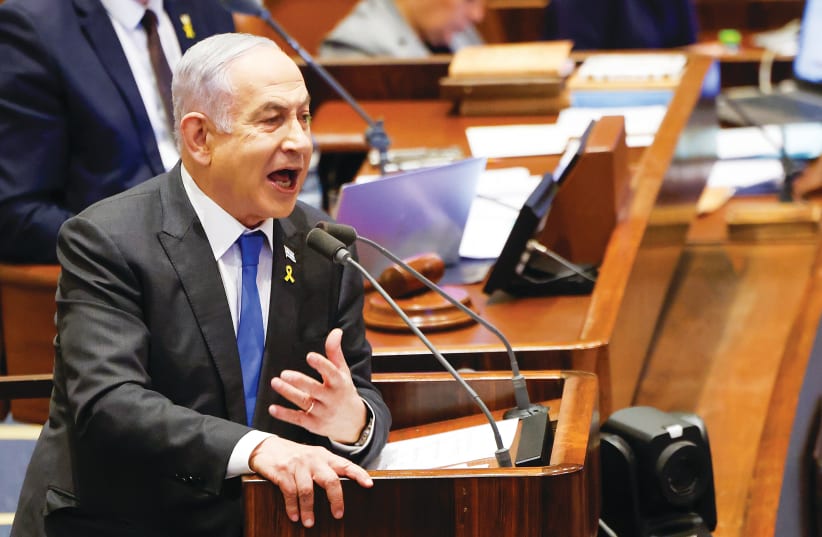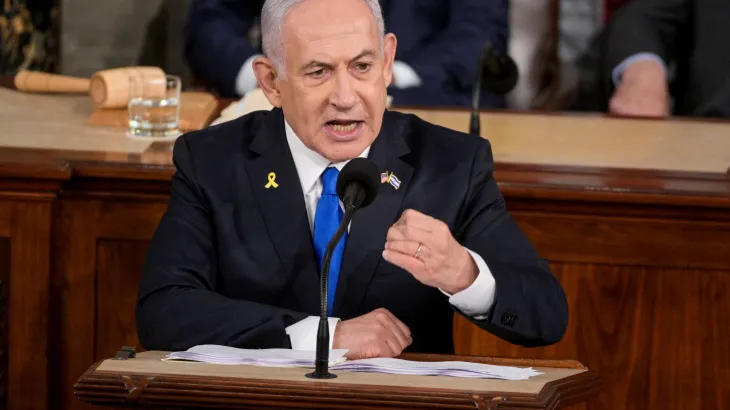Israeli Prime Minister Benjamin Netanyahu addressed a joint session of the United States Congress on Wednesday amidst a fierce and deadly conflict in Gaza. With the death toll of Palestinians surpassing 39,000 and over 1,100 Israelis killed since the war began on October 7, Netanyahu sought to justify Israel’s military actions and counter criticism from the international community.
Historical Context
The Israel-Palestine conflict has deep historical roots, dating back to the early 20th century. Following the end of World War II and the Holocaust, the state of Israel was established in 1948, leading to the first Arab-Israeli war. Over the decades, several wars, uprisings, and peace attempts have punctuated this conflict, with significant tensions and periodic escalations in violence.

Netanyahu’s Main Claims
During his address, Netanyahu made several key points to defend Israel’s military actions in Gaza:
- Israel’s Right to Self-Defense: Netanyahu emphasized that Israel has an inherent right to defend itself against Hamas, which he labels as a terrorist organization.
- Hamas Using Human Shields: He accused Hamas of using Palestinian civilians as human shields, complicating Israel’s military operations.
- Targeting Militants, Not Civilians: Netanyahu claimed that Israel’s military targets Hamas militants and infrastructure, not civilians.
- Humanitarian Efforts by Israel: He highlighted efforts made by Israel to provide humanitarian aid to Gaza and ensure the safety of Palestinian civilians.
-
Fact-Checking Netanyahu’s Claims
Claim 1: Israel’s Right to Self-Defense
Historical Perspective: The concept of self-defense is enshrined in international law, including the UN Charter. However, the proportionality and necessity of force used are often subjects of debate.
International Law Considerations: While Israel’s right to defend itself is widely recognized, the methods and scale of its military actions in densely populated areas like Gaza raise serious legal and ethical questions about proportionality and the protection of civilians.
Claim 2: Hamas Using Human Shields
Evidence and Counterarguments: There are reports and videos showing Hamas operatives in civilian areas. However, independent investigations and human rights organizations have questioned the extent and systematic nature of these practices. The use of civilian areas for military purposes by Hamas complicates the conflict but does not absolve Israel of its responsibilities under international humanitarian law.
Claim 3: Targeting Militants, Not Civilians
Casualty Figures and Targeting Accuracy: The high number of civilian casualties in Gaza suggests that precision targeting is extremely challenging. Reports from organizations like the UN and various NGOs indicate that many civilian structures, including homes, schools, and hospitals, have been hit, raising concerns about indiscriminate attacks.
Claim 4: Humanitarian Efforts by Israel
Aid Access and Conditions in Gaza: While Israel has allowed some humanitarian aid into Gaza, restrictions on movement, access to essential services, and the ongoing blockade have severely affected living conditions. Humanitarian organizations report a dire situation, with shortages of food, medical supplies, and clean water.

-
International Reactions
US Government Response: The US has historically been a staunch ally of Israel, providing substantial military aid and diplomatic support. The Biden administration has reiterated Israel’s right to self-defense but has also called for the protection of civilians and the need for a humanitarian pause.
Reactions from Other Countries: Responses vary widely. European nations and many others have expressed deep concern over the civilian toll and called for ceasefire efforts. In contrast, some countries in the Middle East have strongly condemned Israel’s actions.
Public Opinion and Media Coverage: The conflict has sparked widespread protests and demonstrations globally. Media coverage has highlighted the humanitarian crisis in Gaza, contributing to a growing public outcry against the ongoing violence.
Implications for US-Israel Relations
Military Aid and Political Support: The US continues to provide significant military aid to Israel. However, rising casualties and international scrutiny may pressure lawmakers to reassess this support. Debates within Congress reflect a growing divide over unconditional support for Israel.
Congressional Opinions and Debates: While many members of Congress support Israel’s right to defend itself, there is increasing advocacy for greater accountability and calls for a balanced approach that addresses the humanitarian needs of Palestinians.
Conclusion
Netanyahu’s address to the US Congress sought to justify Israel’s actions in Gaza as necessary for national security. However, his claims are met with substantial scrutiny and criticism, particularly regarding the proportionality of Israel’s military response and the humanitarian impact on Palestinian civilians. The international community remains divided, with ongoing debates about the best path to a peaceful resolution.






















